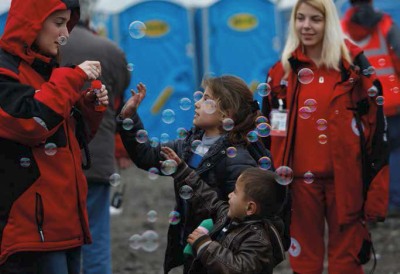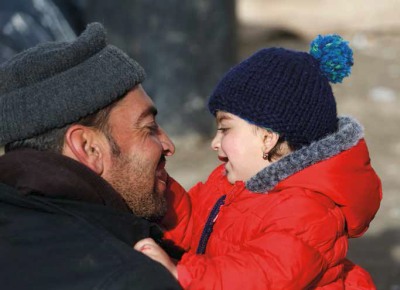articles/Photojournalism/journeyofhope-page2
A Journey of Hope - part 2 of 1 2 3 4
by Darrin Zammit-Lupi Published 01/07/2016

There are more volunteers to meet the boat than there are men, women and children on board the dinghy. Though no single NGO is in charge, things appear to be relatively well organised. Everyone seems to know what they have to do. People are lifted and helped over the side; other volunteers are waiting with blankets and dry socks for the children. Further up on the beach, where the vehicles are parked, other volunteers have set out tables with hot drinks and food. It's all over quickly. Less than half an hour after hitting shore, all the new arrivals are on buses operated by the UNHCR on their way to a reception centre.
The reception centre at Moria is off-limits to the media and most NGOs. Surrounded by high walls lined with barbed wire, it appears ominous. Alongside it, another camp has sprung up, run by a loose coalition of local and international organisations. Known as Afghan Hill, it consists of hundreds of tents on a muddy hillside. Usually, people would only stop there for a day or two while they recover their strength before catching a ferry to the Greek mainland. However, a strike by the ferry workers which has dragged on for days means the camp, like others on the island, is now packed to bursting point as the number of arrivals keeps steadily rising while no one is able to leave.

Getting to the border
The first ferry to reach the mainland in several days at the end of the strike disgorged a mass of humanity in the port of Piraeus. Several hundred people, heavily laden with all manner of belongings they'd received in the camps, poured onto the jetty, to be met by yet another army of NGO personnel and people offering transportation into Athens or straight to the border with Macedonia. Victoria Square, a small public garden in a grubby neighbourhood in downtown Athens, has become synonymous with the migration crisis. Migrants have been flooding the square for several months as it is close to metro stations, and more importantly, a stone's throw away from the departure point of the buses that make the nightly overland journey to the Greek-Macedonian border.
My colleague and I join them on the long and uncomfortable trip. For some reason that remains unclear to me, the driver opts to stay off highways, adding considerably to the travelling time. People's stories remain the same - most are fleeing from Assad's bombs, the Islamic State and the Taliban, and all dream of their final destination being Germany.
Ten hours later, at the crack of dawn, the bus pulls into a parking lot next to a petrol station outside the village of Polikastro, some 24 kilometers from the border crossing at Idomeni. The air is thick with smoke from bonfires around which people are huddling, seeking refuge from the freezing temperatures. The place is full of tents and parked buses.
Please Note:
There is more than one page for this Article.
You are currently on page 2 Contact Darrin Zammit-Lupi
1st Published 01/07/2016
last update 11/11/2019 11:46:30
More Photojournalism Articles
There are 0 days to get ready for The Society of Photographers Convention and Trade Show at The Novotel London West, Hammersmith ...
which starts on Wednesday 14th January 2026








